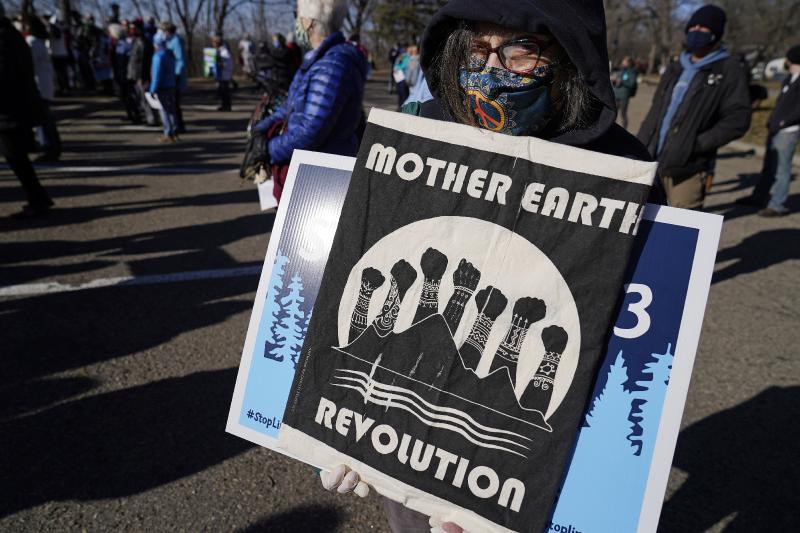Activists and tribal groups prepare Minnesota pipeline protests



Environmental and tribal groups opposed to Enbridge Energy’s ongoing effort to replace its aging Line 3 crude oil pipeline in the United States are planning large protests in northern Minnesota on Monday as the Canadian-based company gears up for a final construction push.
Organisers say they expect hundreds of people to participate in the “Treaty People Gathering”, which they are billing as the largest show of resistance yet to the project. They plan to march to the headwaters of the Mississippi River, one of the water crossings for the pipeline, where they will deliver speeches and participate in organised civil disobedience.
Organisers say they expect hundreds of people to participate in the “Treaty People Gathering”, which they are billing as the largest show of resistance yet to the project. They plan to march to the headwaters of the Mississippi River, one of the water crossings for the pipeline, where they will deliver speeches and participate in organised civil disobedience.
Opponents of the project have said they will do whatever it takes to block completion of it, even if it risks arrest. Among those they say will be on hand on Monday will be actors Jane Fonda, Catherine Keener, Rosanna Arquette and Taylor Schilling, as well as environmentalist and author Bill McKibben.
Line 3 carries Canadian crude from Alberta. It clips a corner of North Dakota on its way across northern Minnesota to Enbridge’s terminal in Superior, Wisconsin. The Canadian and Wisconsin replacement segments are already carrying oil. The Minnesota segment is about 60 percent complete.
Project opponents say the replacement pipeline, which would carry Canadian tar sands oil and regular crude, would worsen climate change and risk spills in sensitive areas where Native Americans hunt, fish, harvest wild rice, gather medicinal plants – and claim treaty rights.
Minnesota Governor Tim Walz told Minnesota Public Radio News that he doesn’t plan to deploy the US National Guard during the event, saying he doesn’t expect protesters to “interfere with lawful construction or lawful practices”.






Jane Fonda is showing up ... better call out the fire department, heads will spontaneously combust.
In addition, a lot of my relatives will be there.
For all of our experts that are pushing this line they should note that it crosses both the Leech Lake Ojibwe reservations and the Fond du Lac Ojibwe reservation. Both fall under the treaties of 1842, 1854 and 1855.
You know what SCOTUS called the highest law in the land, treaties.
I sent a donation.
Thank you, so did I, and of course all of my relatives that could not be there did the same.
The governor obviously needs to read the court decisions of 1974 and 2018 before he opens his mouth about "lawful construction". The courts, even though in Washington, state, very specifically, that is it the owner of the project to ensure, through environment enforcement, that the properties being impacted will not, in any way, harm the environment's natural progressions nor the livelihoods of treaty rights and obligations.
Hell, Washington state and Oregon both have to refurbish the properties/lands to its "original" state by moving/repairing/replacing all aqueducts/water transmission to ensure those standards are met for the salmon and other species to propagate and migrate as they have done since time immemorial.
Such protests need more national media exposure. Hopefully they will get it this time.
Good luck. Perhaps this can get diverted around some of richest waterways the US currently has. I doubt it will be stopped completely, including where it crosses under the Mississippi.
Enbridge Line 3 will cross many lakes and rivers. It will cross the Mississippi River twice once very close to the headwaters of the largest and one of the most important rivers in North American.
This is a photo of the actual headwaters of the Mississippi as it starts its 2500 mile journey to the Gulf of Mexico.
And this is Animikii Zaagijiwan (Thunder that flows from the River) walking into the headwaters, a very spiritual experience.
Why should Canada benefit from ruining our water and land? And a treaty is more than just a contract.
If they want to replace them, they should move them somewhere else.
If it is already there, why not just put it adjacent and follow the same route? Seems the "groundwork" (mapping) is already done and it wouldn't intrude on any appreciable amount of new land. If the route it takes now is that established, it shouldn't be a problem.
What the hell am I missing?
the trick of understanding a treaty
Time, method, exposure, lack of environmental documentation and record of previous exposure.
Other than that - not much
We should not.
How many pipelines already underlie those tribal lands?
Pipelines are safer than rail cars or tanker trucks.
The oil will be shipped somewhere...doesn't make sense to leave the line uncompleted.
does it make sense to you to risk the US water ways/supply to enrich a Canadian Company that would ship oil via a pipeline that " would carry Canadian tar sands oil and regular crude, would worsen climate change and risk spills in sensitive areas where Native Americans hunt, fish, harvest wild rice, gather medicinal plants – and claim treaty rights."
Cause i don't see how the US benefits
Because trains carrying tanker cars never derail and affect the environment adversely./S
Of course the Democrats are all for oil moving by rail. Two of their biggest contributors hold major stock in the BNSF, CP, and CSX. They are making millions every time the Democrats shut down an oil or gas pipeline.
How much oil is in a tanker car of a train, and what happens when a pipeline is ruptured...?
Being a law and order person that you are Ronin the areas are protected by treaty rights and don't have a damn thing to do with your bullshit comment.
Greg - we've had this discussion before. Under the treaties signed by the U.S. and Indian Nations/Tribes - and under NUMEROUS Fed laws, if a project has the "POTENTIAL" of impacting the health, safety and welfare of persons/environment, it is not to be continued unless/until mitigation has been drafted/approved by the project manager, the affected plaintiffs, and possibly the Council on Environmental Quality (National Environmental Policy Act, 1969).
Under NEPA, the project managers are REQUIRED to conduct consultation with the Nations/Tribes on each and every step of the project, as explained and defined in the Environmental Impact Statement. More powerful than that though are all the treaty requirements that clearly protect the health, safety and welfare of the Nations/Tribes - all rights supported/protected by various laws passed by Congress, but primarily by the U.S. Constitution.
Remember the statement "Treaties are the law of the land"? Our constitution declares a treaty to be the law of the land. It is, consequently, to be regarded in courts of justice as equivalent to an act of the legislature, whenever it operates of itself, without the aid of any legislative provision. Treaties with the Indian Nations/Tribes hold much more power/strength than your basic Congressional laws.
Meaningful coordination with Tribal entities, and analysis of a proposed action's potential affect on Tribal lands, resources, or areas of historic significance is an important part of Federal agency decision making. In addition to provisions in Sections 1501.2 and 1501.7 of the CEQ Regulations that call for the involvement of Tribes that may be affected by a Federal proposal, CEQ issued a Memorandum to the Heads of Federal agencies encouraging more active solicitation of Tribal entities for participation as cooperating agencies in NEPA documents.
In addition, Executive Order 13175, Consultation and Coordination With Indian Tribal Governments (November, 6 2000), outlines requirements for consultation with Tribal Governments. Finally, most Federal agencies have policy documents that provide agency-specific provisions for coordination with Tribal entities. All of these requirements are applied, when appropriate, during the NEPA process.
If the Indian Nations/Tribes and the environmental community believe and support the potential for environmental consequences to the health, safety and welfare of persons/environment, treaty rights give the Indian Nations/Tribes a much more powerful position than does a contract for construction/maintenance.
Pipelines are far from being "safer than rail cars or tanker trucks". That is ludicrous - they are cheaper, but far from safer.
Table 2: Incident Counts and Volume of Crude Oil Shipped per Incident show that pipelines have had, over a 9 year period, over 1 BILLION gallons of crude spilled/leaked while rail had 23 million gallons and truck had almost 48 million gallons spilled/leaked during that same timeline. None of them are acceptable per the phmsa, but pipelines are the most destructive.
.
.